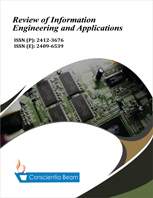Investigation on the Dependence of TCP Upstream Throughput on Snr for Single and Multiple Links in a Wlan System
DOI:
https://doi.org/10.18488/journal.79/2015.2.1/79.1.15.32Abstract
An empirical investigation on the dependence of TCP upstream throughput (TCPupT) against signal to noise ratio (SNR) in an IEEE802.11b WLAN system was carried out in various environments and varieties of QoS traffic using an Infrastructure based IEEE802.11b WLAN system set up consecutively in various environments (open corridor, small offices with block walls or plaster boards and free space). Empirical models describing the TCPupT against SNR for different signal ranges (all signals, strong signals, grey signals and weak signals) were developed and validated for both single and multiple users on the network. Our results show a strong dependence of TCPupT on the received SNR which varied as the SNR values changed from high (strong signals) through low (grey signals) to very low (weak signals). Our models showed lower RMS errors when they and other similar models were compared with validation data. We observed RMS errors of 0.5605471Mbps, 0.4479389Mbps, 1.04536603Mbps and 0.5813471Mbps for the General, Strong signals, Grey signals and Weak signals models respectively for the single user scenario. We also observed RMS errors of 1.3319396Mbps, 0.9457431Mbps, 0.8092979Mbps and 0.4220292Mbps for the multiple users scenario. An appreciable difference was observed between the throughput behavior for single and multiple users on the network showing the inefficiency of the distributed coordination function and Point coordination function used in WLANs as access mechanisms. Our models will provide researchers and WLAN systems users with a tool to estimate the TCP upstream throughput in a real network in various environments by monitoring the SNR.

